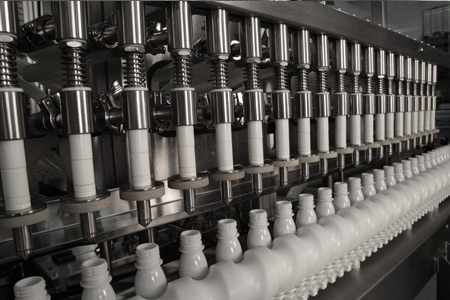Filling machines are an integral part of the production line when you are manufacturing any kind of liquid product. When used in conjunction with capping and labeling machines, they make delivering ready-to-sell bottles or containers of your product a fast, smooth and reliable process. Whether you are making bottles of juice or bottles of antifreeze, it is important that in choosing your filling machine, you consider the qualities of your liquid. There are a very broad spectrum of different fillers available, and they are all suited to different fluids.

Using the wrong kind of filler can cause damage to your machine, can spoil your product, or can just fail to work at all, so before you talk to a filler manufacturer, make sure you have considered the following characteristics and where your product sits:
Viscosity
This equates to how ‘thick’ your product is, though in true physics terms it relates to how resistant it is to flow. Viscosity is important because it affects things like the speed at which the filler can move it and the pressure required to do so. Watery products have low viscosity, creamy products tend to be medium, whereas something with high viscosity would be honey or paste. Knowing how viscous your product is is vital to getting the right machine and pump specifications.
Particulates
In simple terms, this relates to whether your product is lumpy or has bits in it. A clear fluid has no particulates, a juice with a small amount of pulp would be considered medium, whereas a sauce with big vegetable chunks in it would be considered to have a high particulate level. This doesn’t just apply to food, any kind of grit or sediment present in your product are also particulates. These can clog up the wrong kind of machine or cause other damage.
Temperature
Consider the temperature your product needs to be at when it is delivered into its containers. Would a high temperature damage it or alter its properties? Or do you need your filler to bottle it hot? There are different types of machines for hot and cold filling, so you need to understand the needs of your own fluids.
Carbonation
Products that are ‘fizzy’ also require specific types of machine. Usually carbonated products are beverages, and so you should already know if this applies to what you are looking to bottle.
Foam
How much foam your product creates, if any, as it goes through the machine and into the bottles will be another factor that you will need to understand when choosing a machine. Foaming products can include those that are carbonated, along with soap type products, but even watery liquids can produce a kind of froth that your machine will need to be able to handle.
Chemicals
If you are producing potentially harmful, corrosive or otherwise sensitive chemicals, whether it is for the pharmaceutical or lab industry, or simply a cleaning or automotive fluid, you will need to consider this in your choice of machine.
Because companies like Inline, with many options for filling machines found at http://www.fillers.com/filling-machine/, can produce higher quality machines that fill accurately, selecting ones that can meet your standards based off the above product types shouldn’t be hard.
Understanding the different qualities and properties of your product is vital to getting the best machine for the job, and will also help you in your initial inquiries with machine manufacturers. They will find it hard to assist you if you can’t tell them too much about what you are bottling, so make sure you have an idea of how it stands in each of these categories before you begin to shop.
